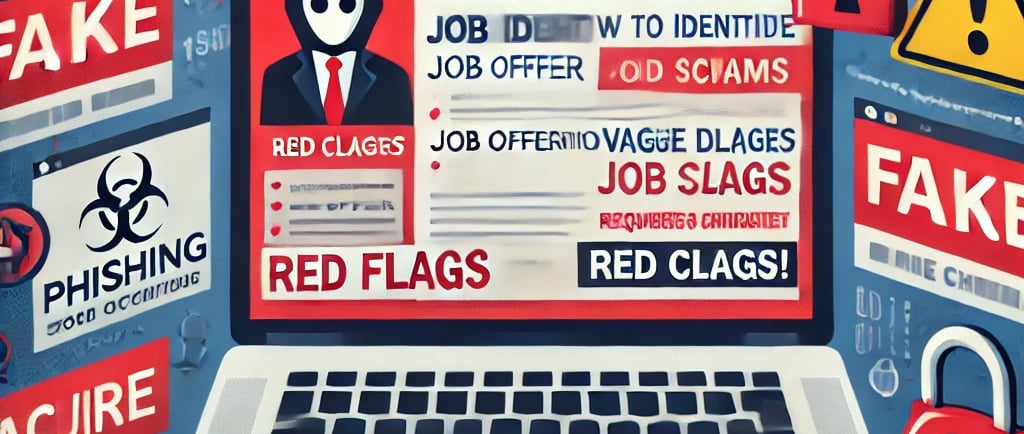How to Identify and Avoid Job Scams: A Guide for Canadian Job Seekers
Navigating the job market can be risky, with online scams targeting unsuspecting job seekers. Common scams include phishing, fake job offers, and cheque-cashing schemes. Red flags to watch for include unsolicited job offers, vague descriptions, and upfront payment requests. Protect yourself by researching companies, verifying job postings, guarding personal information, and using trusted job platforms. If you’ve been scammed, cease communication, report the incident, monitor accounts, and change passwords. Stay vigilant and safeguard your job search process.
Jason Elias
8/19/20243 min read


Navigating the job market can be challenging, especially with the rise of online job postings that may not always be legitimate. For Canadian job seekers, it’s crucial to be vigilant about job scams that could lead to financial loss, identity theft, and wasted time. Here’s how to identify and avoid job scams, ensuring your job search is safe and successful.
Understanding Common Job Scams
Job scams come in various forms, often disguised as legitimate opportunities. Some of the most common scams in Canada include:
1. Phishing Scams
- Scammers use fake job postings or emails to steal your personal information. They might request your Social Insurance Number (SIN), banking details, or other sensitive information under the pretense of pre-employment checks.
2. Fake Job Offers
- You may receive a job offer immediately, without an interview, often for a role that seems too good to be true. These scammers typically ask for an upfront payment for things like training materials or background checks.
3. Cheque Cashing Scams
- In this scam, you're asked to deposit a cheque and then wire a portion of the money elsewhere. The cheque eventually bounces, leaving you responsible for the full amount.
4. Work-From-Home Scams
- While there are many legitimate remote jobs, scammers exploit the appeal of working from home by offering fake opportunities that require you to pay for supplies or training upfront.
5. WhatsApp Recruitment Scams
- Be especially cautious if a recruiter contacts you via WhatsApp. Legitimate companies typically use official channels like email or LinkedIn. WhatsApp communications, especially those asking for personal information, can be a red flag.
Red Flags to Watch Out For
When evaluating a job opportunity, be mindful of these warning signs:
1. Unsolicited Job Offers
- Be cautious if you receive a job offer out of the blue, especially if you didn’t apply for the position. Legitimate employers typically won’t reach out without prior interaction.
2. Vague Job Descriptions
- Job postings with little detail about the role or responsibilities are suspicious. Legitimate postings provide clear information about the position.
3. Upfront Payment Requests
- Never pay for a job application, training, or background check. Legitimate employers do not ask for money during the hiring process.
4. Unprofessional Communication
- Watch out for poorly written job descriptions, emails with typos, or employers using personal email addresses (like Gmail or Yahoo) instead of official company domains.
5. Immediate Job Offers
- If an employer offers you a job immediately after you submit your resume, without an interview or any due diligence, it’s likely a scam.
6. WhatsApp Outreach
- If a recruiter contacts you through WhatsApp, especially with immediate job offers or requests for personal information, be very cautious. This is often a tactic used in scams.
Protecting Yourself from Job Scams
Here’s how you can protect yourself while searching for jobs in Canada:
1. Research the Company
- Before applying, research the company’s name, website, and contact information. Check for online reviews and look up the company on LinkedIn to ensure it’s legitimate.
2. Verify Job Postings
- Visit the company’s official website to see if the job is listed there. Be cautious of job postings that only appear on third-party sites with no trace on the company’s official page.
3. Guard Your Personal Information
- Never share sensitive information, such as your SIN or banking details, until you’ve confirmed the legitimacy of the employer. Legitimate companies will only request this information after you’ve been hired.
4. Trust Your Instincts
- If something feels off about a job opportunity, trust your instincts. It’s better to pass on a questionable offer than to risk falling victim to a scam.
5. Use Trusted Job Platforms
- Stick to reputable job boards and career websites like LinkedIn, Indeed, or Glassdoor. These platforms have measures in place to help detect and remove fraudulent postings.
6. Be Cautious with WhatsApp
- If a recruiter reaches out via WhatsApp, be wary. Verify their identity and the company they represent through official channels before proceeding.
What to Do If You’ve Been Scammed
If you’ve already fallen victim to a job scam, take immediate action:
1. Stop All Communication
- Cease all contact with the scammer immediately. Block their phone number, email address, and social media profiles.
2. Report the Incident
- Report the scam to the Canadian Anti-Fraud Centre, your bank, and any relevant job platforms.
3. Monitor Your Accounts
- Keep a close eye on your bank accounts and credit reports for any unauthorized activity. Consider placing a fraud alert on your credit file.
4. Change Your Passwords
- If you’ve shared any account information, change your passwords immediately and enable two-factor authentication where possible.
The job search process can be challenging, but by staying vigilant and informed, you can protect yourself from job scams. Always do your research, trust your instincts, and be cautious with your personal information. Remember, a legitimate job opportunity will never require you to compromise your security. Stay safe and focused on finding the right, authentic role for your career growth.
If you suspect a job scam, don’t hesitate to report it and take the necessary steps to safeguard your personal information. Your diligence can make all the difference.
